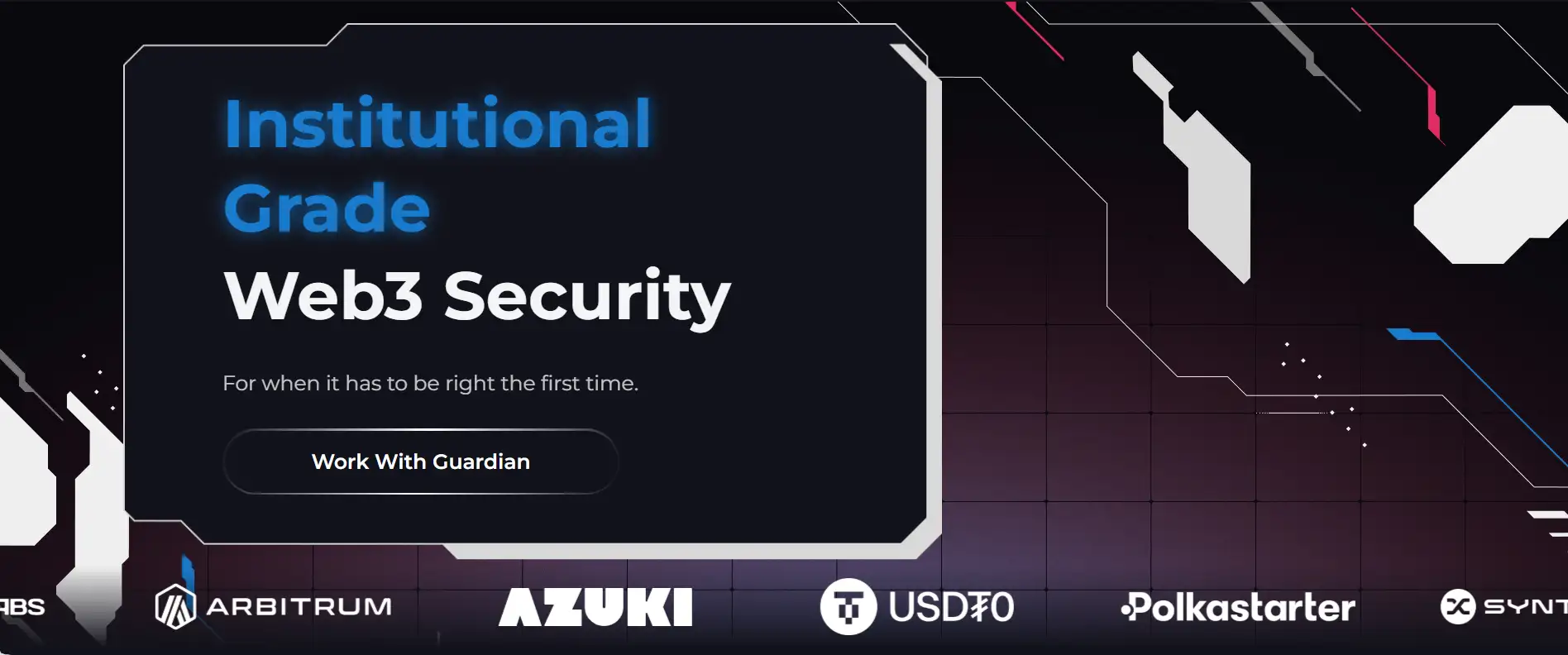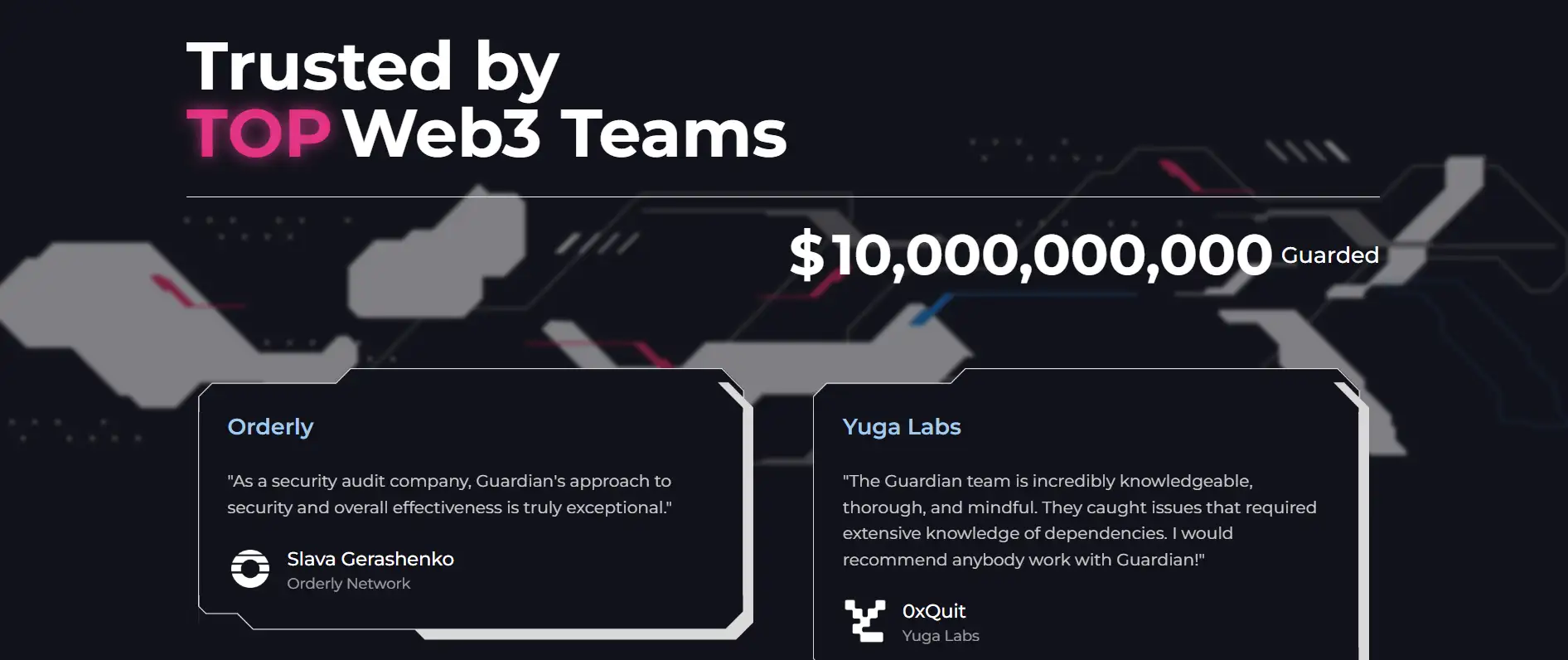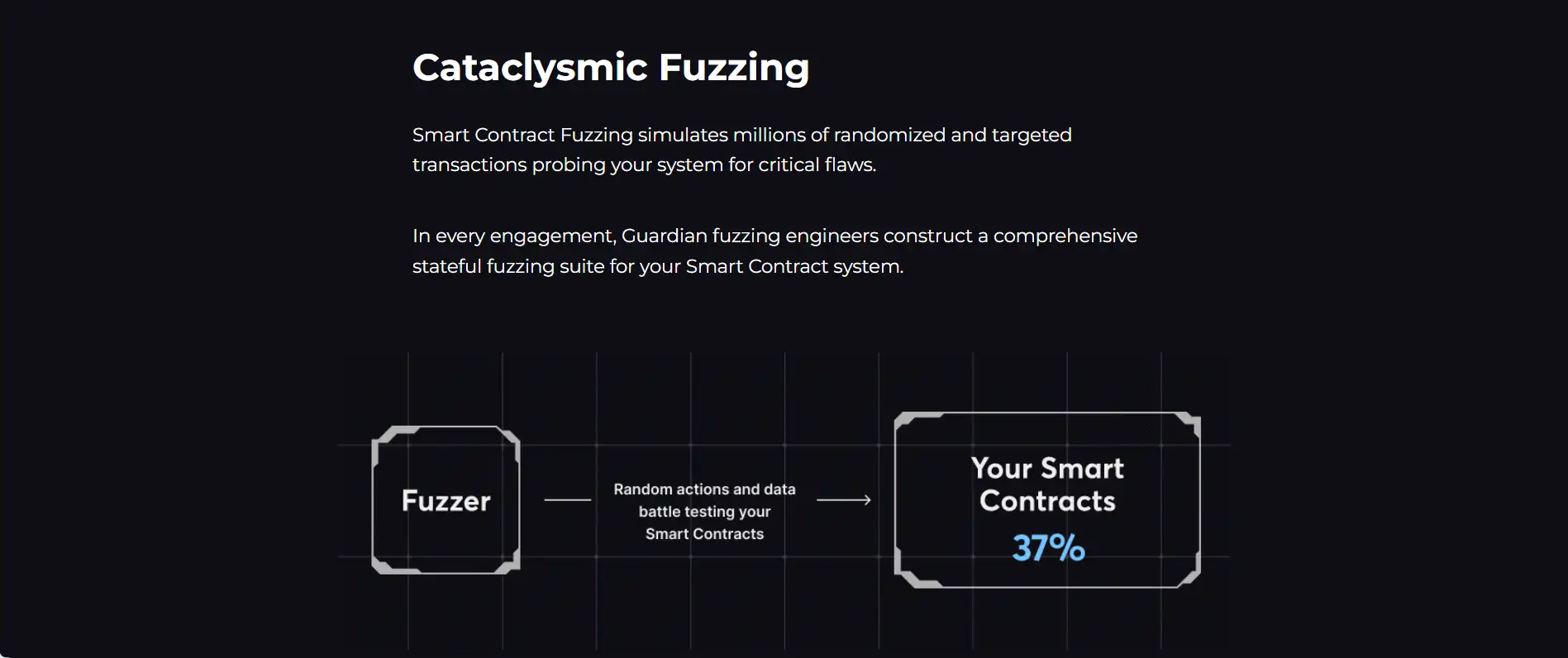About Guardian
Guardian is a leading Web3 security auditing company specializing in high-stakes, institutional-grade smart contract reviews. With a unique two-team methodology, Guardian delivers unmatched scrutiny and depth in every audit it performs. Their mission is clear: to secure the next generation of DeFi infrastructure by rigorously testing for vulnerabilities before they can be exploited. Clients include top protocols like GMX, Synthetix, Yuga Labs, Azuki, and Polkastarter, all of whom trust Guardian’s detailed process to secure billions in TVL.
At Guardian, audits are not just line-by-line code reviews—they are battle tests. With tools like cataclysmic fuzzing, real-time remediation feedback, and pay-per-vulnerability pricing models, the platform sets a new standard in Web3 security. Guardian is at the forefront of protecting decentralized protocols, combining manual research with automated intelligence in a process that is both collaborative and transparent.
Founded with the goal of becoming the most rigorous and respected name in Web3 smart contract security, Guardian has become the go-to firm for protocols seeking thorough, professional, and scalable audit services. The platform is particularly well known for its “two-team” methodology: every engagement involves two independent auditing teams reviewing the same codebase in parallel. This dual-layer review uncovers deep vulnerabilities that single-team audits often miss. It has allowed Guardian to prevent over $10 billion in potentially compromised smart contracts.
Guardian’s services include pre-launch audits, ongoing post-launch review cycles, remediation validation, and advanced fuzzing. During fuzzing, the system simulates millions of interactions to discover complex exploit paths. Each client receives not only a final PDF report but also access to a real-time dashboard with findings, a repository of proofs-of-concept, and a fuzzing suite that continues delivering security insights even after the engagement ends.
What makes Guardian particularly appealing to serious DeFi projects is its adaptability. Projects can choose between flat-fee pricing or a bold pay-per-vulnerability model, which reflects the company’s confidence in its detection process. Their portfolio includes flagship audits for protocols like GMX, Synthetix, Yuga Labs, and Polkastarter. Similar security-focused competitors include Trail of Bits, OpenZeppelin, and Certik, though Guardian is known for deeper manual testing and advanced fuzzing protocols.
Guardian's team is composed of elite researchers who specialize in areas ranging from Solidity inline assembly to cross-chain protocol design. The company is also deeply invested in educating the ecosystem, sharing best practices and contributing to public audits. Their vision is rooted in enabling the future of “Institutional DeFi,” where trillions of dollars of assets will be governed by code. Guardian’s mission is to make sure that code is secure.
Guardian provides numerous benefits and features that make it a standout in the smart contract security landscape:
- Dual-Team Audit Methodology: Every audit includes two independent teams working separately to uncover issues, doubling the depth of analysis and reducing oversight.
- Cataclysmic Fuzzing: Guardian’s proprietary fuzzing engine generates millions of test cases to identify edge-case vulnerabilities often missed by static analysis.
- Real-Time Findings Dashboard: Clients access a private board to monitor discovered issues, receive remediation recommendations, and communicate with Guardian researchers throughout the engagement.
- Flexible Pricing Models: Choose between flat-cost engagements or pay-per-vulnerability options—ideal for projects confident in their code or needing budget flexibility.
- Remediation Re-Audits: All fixes are re-tested and fuzzed again to ensure no new vulnerabilities were introduced.
- Extensive Portfolio: Guardian has conducted in-depth audits for over 200+ critical contracts including GMX V2, Synthetix BFP Market, Yuga Labs NFTs, and more.
- Post-Audit Security Continuity: Delivered fuzzing suites continue running even after the audit is complete, extending protection into production.
Guardian makes starting a security engagement simple, yet selective. The process is rigorous, ensuring each client meets high standards for collaboration and audit readiness. Here's how to begin working with Guardian:
- Submit an Application: Go to the official site and click "Get a Quote." Fill out details about your protocol, audit timeline, and codebase.
- Meet Engagement Criteria: Guardian reviews your request based on internal vetting and scope requirements before proceeding.
- Kickoff Call: If accepted, a kickoff call is scheduled to download context and finalize timelines and engagement structure.
- Audit & Fuzzing: Guardian starts the audit using both teams, along with the fuzzing suite and real-time board access.
- Remediation & Final Report: Clients are guided through fixing issues, after which Guardian performs a re-audit and delivers the final security report.
Guardian FAQ
Guardian uses a dual-team audit model, where two elite researcher teams review your code independently. This significantly increases issue detection compared to standard single-team reviews. It's a rigorous system that provides redundancy and broader coverage, making Guardian’s audits among the most trusted in Web3 security.
Cataclysmic Fuzzing is a key part of every Guardian engagement. After your audit ends, Guardian provides you with a custom-built fuzzing suite that continues to test your smart contract logic on an ongoing basis. This means vulnerabilities can still be caught even after launch, offering post-deployment security assurance.
Yes, Guardian offers two pricing models: Flat-cost and Pay-per-vulnerability. Flat-cost fits teams with specific budgets, while pay-per-vulnerability is ideal for confident projects that want to only pay based on actual findings. Both models offer full access to Guardian’s audit and fuzzing services.
Guardian doesn’t just find problems—they help fix them. During the remediation phase, Guardian provides hands-on support to guide your team through every vulnerability. Once the fixes are applied, both auditing teams independently verify and re-audit the code to ensure the vulnerabilities are resolved.
You Might Also Like












